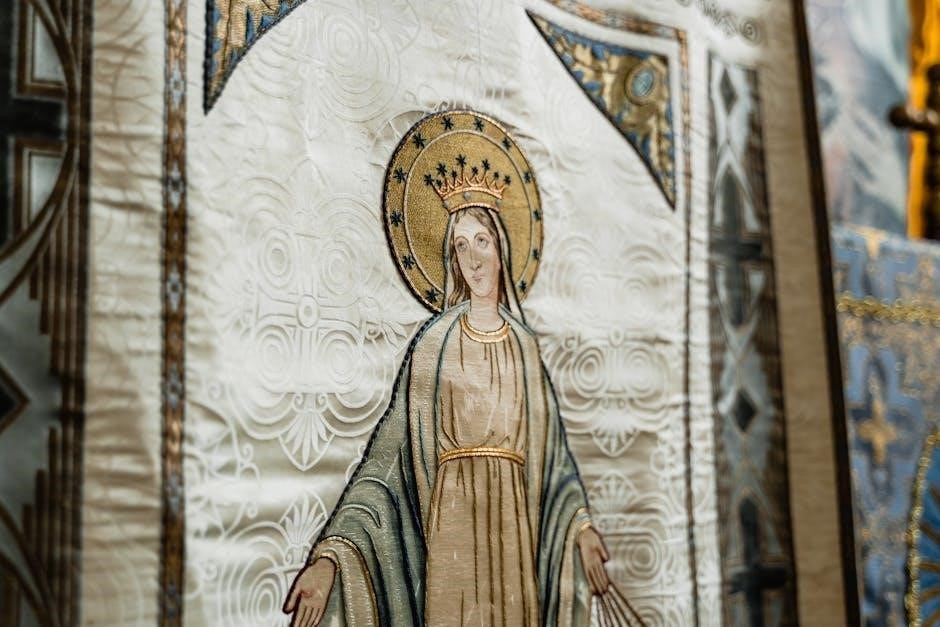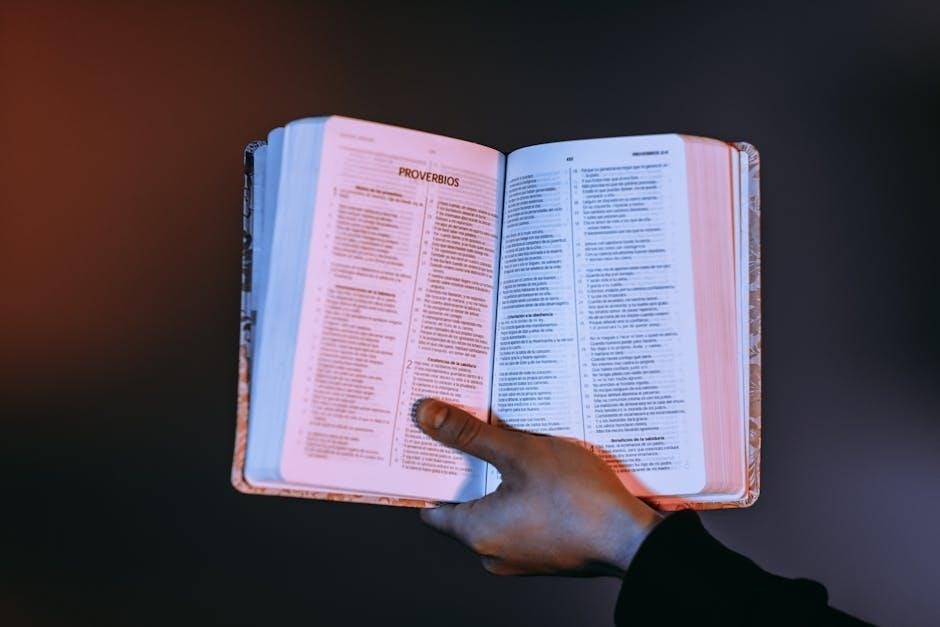The Book of Exodus is a foundational biblical text detailing the Israelites’ journey from Egyptian slavery to covenant relationship with God. It explores themes of deliverance, obedience, and worship, providing rich material for spiritual growth. This study guide offers key questions and answers to deepen understanding of Exodus, enhancing both individual and group Bible study experiences with practical applications and theological insights.
Importance of Studying Exodus
Studying Exodus is essential for understanding God’s plan of redemption and His covenant relationship with humanity. It reveals His power, faithfulness, and mercy, while highlighting the importance of obedience and faith. Exodus provides deep insights into leadership through Moses’ journey, offering lessons in humility, trust, and divine guidance. The book also introduces key theological concepts like the Ten Commandments and the Tabernacle, which shape Christian worship and ethics. By exploring Exodus, believers gain a stronger foundation for their faith, discovering how God’s deliverance of Israel mirrors spiritual redemption in Christ. Its themes of freedom, holiness, and God’s presence remain relevant today, inspiring personal and communal transformation.
Overview of the Book of Exodus
The Book of Exodus, written by Moses, is the second book of the Old Testament, detailing the Israelites’ deliverance from Egyptian slavery. It recounts their journey under Moses’ leadership, the miraculous parting of the Red Sea, and the establishment of the covenant at Mount Sinai. Key events include the Ten Plagues, the giving of the Ten Commandments, and the construction of the Tabernacle. Exodus portrays God’s power, mercy, and desire for a holy people, while illustrating humanity’s need for redemption. This book is central to understanding God’s character, His relationship with humanity, and the foundational principles of worship and obedience that shape both the Old and New Testaments.

Key Themes and Events in Exodus
Exodus explores themes of deliverance, divine presence, and covenant, highlighting events like the Ten Plagues, the Exodus, and the giving of the Ten Commandments, showcasing God’s power and redemption.
The Israelites in Slavery
The Israelites endured harsh slavery in Egypt, subjected to forced labor and oppression. Despite their suffering, they multiplied, prompting the Egyptians to impose even greater cruelty. Pharaoh ordered male infants to be killed, fearing the Israelites’ growth. Moses’ early life, hidden by his mother, exemplifies this perilous time. The Israelites’ cries reached God, who remembered His covenant with Abraham, setting the stage for their deliverance. Their slavery tested their faith, yet it also highlighted God’s faithfulness and plan for redemption, ultimately leading to Moses’ calling and the miraculous Exodus.
The Calling of Moses
Moses’ calling began with a divine encounter at the burning bush on Mount Horeb, where God revealed Himself as the “I AM” and commissioned Moses to lead the Israelites out of Egypt. Initially hesitant, Moses questioned his ability, citing his speech impediment and fear of rejection. God responded by providing three miraculous signs—the staff turning into a serpent, Moses’ hand becoming leprous, and water turning to blood—to convince both Moses and the Israelites of His presence. Despite Moses’ continued reluctance, God assured him of His support and appointed Aaron as his spokesman. This pivotal moment marked Moses’ transformation from a fugitive shepherd to a leader of God’s people.
The Ten Plagues and the Exodus

The Ten Plagues were a series of divine judgments God unleashed upon Egypt to compel Pharaoh to release the Israelites from slavery. Each plague, escalating in severity, targeted Egypt’s idols and natural resources, culminating in the death of every firstborn son. The final plague necessitated the first Passover, where Israelites marked their doors with lamb’s blood to spare their children. After the tenth plague, Pharaoh relented, and the Israelites departed hastily. God miraculously parted the Red Sea, allowing them to escape, then destroyed the pursuing Egyptian army. This dramatic deliverance solidified Israel’s identity as God’s chosen people and foreshadowed redemption themes in the New Testament.
Bible Study Questions on Exodus
Engage with Exodus through quizzes, reflection questions, and study guides. Explore themes, characters, and events, enhancing understanding of God’s deliverance and covenant with Israel.
Questions on Exodus 1-12

Explore Exodus 1-12 with in-depth questions covering the Israelites’ oppression in Egypt, Moses’ calling, and the ten plagues. Understand the significance of the Passover and how it symbolizes redemption. Reflect on Moses’ leadership challenges and the role of faith in obedience. These chapters highlight God’s power and mercy, offering insights into His covenant with Israel. Study guides and quizzes provide structured learning, while cross-references to the New Testament reveal connections to Jesus’ life and mission. Engage deeply with the text to apply its lessons on trust, deliverance, and worship in modern life.
Questions on Exodus 13-25
Delve into Exodus 13-25, focusing on the Israelites’ wilderness journey, the parting of the Red Sea, and the giving of the Ten Commandments; Study questions explore the significance of the pillar of cloud and fire, the provision of manna, and the importance of the Sabbath. Reflect on Moses’ role in mediating God’s covenant and the people’s struggle with faith. These chapters emphasize obedience, trust, and God’s holiness. Analyze how the Ten Commandments establish a moral framework and their relevance today. Engage with cross-references to other biblical texts to deepen understanding of God’s character and redemption plan.

Questions on Exodus 26-40
Exodus 26-40 details the construction of the tabernacle, emphasizing God’s detailed instructions for worship. Study questions explore the significance of the tabernacle’s design, materials, and furnishings, such as the ark of the covenant and the altar of incense. Analyze the role of Bezalel and Oholiab in crafting these sacred items. Reflect on the priesthood’s establishment, including Aaron’s consecration and the garments symbolizing holiness. Discuss the golden calf incident, highlighting the consequences of idolatry and Moses’ intercession. These chapters underscore obedience, worship, and God’s presence among His people. Engage with questions about the tabernacle’s symbolism and its connection to Christ in the New Testament.

Answering Bible Study Questions
Answering Bible study questions on Exodus involves understanding key themes like Moses’ leadership, the Ten Commandments, and the tabernacle. These elements provide insights into faith, obedience, and worship, emphasizing God’s presence and guidance throughout Israel’s journey.
Understanding Moses’ Leadership
Moses’ leadership in Exodus exemplifies faith, humility, and obedience to God. Initially reluctant, he accepted his calling after divine assurance. He demonstrated courage by confronting Pharaoh, performing miracles, and leading the Israelites out of slavery. His leadership faced challenges, including rebellion and doubt, yet he remained steadfast. Moses’ humility and willingness to intercede for his people highlight his compassionate nature; However, his impulsive actions, like striking the rock at Meribah, show his humanity. His leadership teaches the importance of trusting God, seeking guidance, and maintaining faith despite adversity, making him a pivotal figure in Israel’s history and spiritual journey.
The Role of the Ten Commandments
The Ten Commandments, revealed to Moses on Mount Sinai, form the cornerstone of God’s covenant with Israel, outlining moral, ethical, and ceremonial laws. They establish a framework for worshiping God and maintaining just relationships within society. These commandments emphasize loyalty to God, respect for life, and honesty, serving as a foundation for Israel’s identity and conduct. Their universal principles continue to guide believers today, reflecting God’s desire for holiness and love. Jesus later affirmed their significance, highlighting their enduring relevance in shaping moral behavior and spiritual growth for generations.
The Significance of the Tabernacle
The Tabernacle was a sacred space where the Israelites worshiped and offered sacrifices, symbolizing God’s presence among them. Built according to divine instructions, it housed the Ark of the Covenant and the mercy seat, emphasizing God’s holiness and the need for atonement. As a portable structure, it represented God’s dwelling until the Temple was built. The Tabernacle’s design and rituals highlighted the importance of purity and mediation by priests. In the New Testament, Jesus fulfills the Tabernacle’s symbolism as the ultimate sacrifice and the presence of God. Its teachings on holiness and atonement remain vital for understanding worship and community life, reflecting God’s desire to dwell among His people.

Connections to the New Testament
The Exodus story prefigures New Testament themes, such as redemption through Jesus Christ. The Tabernacle’s symbolism and the Passover find fulfillment in Christ’s sacrifice and resurrection, reflecting divine redemption.
Exodus and the Life of Jesus
The life of Jesus mirrors key Exodus themes, symbolizing a new exodus. Jesus’ baptism, wilderness temptation, and resurrection parallel Israel’s deliverance, highlighting His role as the ultimate Deliverer. The Passover, central to Exodus, finds fulfillment in Jesus as the Lamb of God, sacrificed for redemption. His teachings emphasize freedom from spiritual slavery, echoing Exodus’ liberation narrative. The Eucharist reflects Passover, uniting believers in Christ’s saving work. Jesus’ ministry thus embodies a spiritual exodus, offering eternal freedom through His sacrifice and resurrection, fulfilling Old Testament promises and inaugurating a new covenant.
Exodus and the Early Church

The early church drew parallels between the Exodus story and their experiences, viewing themselves as a new community of God’s people. The Passover, central to Exodus, became a symbol of Christ’s sacrifice, with the Eucharist reflecting this covenant renewal. Early Christians, like the Israelites, faced persecution and sought deliverance, finding hope in Exodus’ promises of liberation. Apostles like Peter and Paul referenced Exodus themes in their teachings, emphasizing God’s faithfulness and the call to holy living. The early church saw itself as part of a continuing exodus, journeying toward eternal life, with Christ as their ultimate Deliverer and guide.
Practical Applications of Exodus
Exodus teaches timeless lessons on faith, obedience, and trusting God’s plan. It emphasizes leadership, perseverance, and community, offering modern relevance for personal and collective spiritual growth.
Lessons on Faith and Obedience
Moses’ journey exemplifies unwavering faith and obedience to God’s commands. Despite overwhelming challenges, Moses trusted divine guidance, showing reliance on God’s promises. The Israelites’ experiences highlight the importance of following God’s laws, even when circumstances seem insurmountable. Modern believers can apply these lessons by staying faithful during trials and obeying God’s Word, even when it requires sacrifice. Studying Exodus reveals how faith and obedience lead to spiritual freedom and a deeper relationship with God, offering practical wisdom for navigating life’s difficulties with trust and surrender.

Modern-Day Relevance of Exodus
The story of Exodus remains deeply relevant today, offering timeless lessons on freedom, identity, and trust in God. Just as the Israelites sought deliverance from oppression, modern believers can apply these principles to overcome personal and societal challenges. Moses’ leadership challenges and the people’s struggles mirror contemporary issues of faith, doubt, and obedience. The Ten Commandments and the Tabernacle’s symbolism continue to guide moral living and worship. Exodus encourages believers to trust God’s plan, even in uncertainty, and to live as a holy people in a world that often contradicts divine values, providing a powerful framework for navigating modern life.
